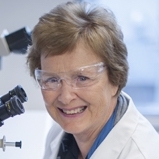Three haematology researchers from the Walter and Eliza Hall Institute of Medical Research (WEHI), Melbourne, are among 29 of the nation’s top medical and health researchers elected as Fellows of the Australian Academy of Health and Medical Sciences (AAHMS) in recognition of their outstanding contributions to health and medical research in Australia.
 Former WEHI director Professor Suzanne Cory is elected to the Academy for her contributions to cancer genetics.
Former WEHI director Professor Suzanne Cory is elected to the Academy for her contributions to cancer genetics.
“With Jerry Adams, she discovered that chromosome translocations associated with human Burkitt’s lymphomas activate the oncogene MYC, which promotes cell proliferation. By modelling this translocation in transgenic mice, they proved it to be causative. Professor Cory’s work also played a role in the discovery that BCL-2, translocated in follicular lymphoma, promotes cancer by impairing apoptosis. Detailed analysis of mechanism with their colleagues culminated in the anti-BCL-2 drug venetoclax, which is revolutionising cancer treatment.
Molecular biologist Professor Jerry Adams of the WEHI Blood Cells and Blood Cancer Division has been elected in recognition of his ground-breaking work on the BCL-2 gene that led to the development of venetoclax, according to the Academy. His lab showed that the chromosome translocations hallmarking certain lymphomas represent activation of oncogenes by juxtaposed immunoglobulin (Ig) locus enhancers, it noted, with the prototype being MYC activation by enhancer Eμ. Their tumorigenic impact was revealed by engineering transgenic mice, such as Eμ-MYC mice, which remain an invaluable tumour model worldwide.
“The seminal discovery that the BCL-2 gene drives lymphomagenesis by preventing apoptosis, and his many contributions on how BCL-2 and its relatives control apoptosis have directly stimulated development of the BCL-2 inhibitor venetoclax, which is revolutionising treatment of CLL and AML patients,” the Academy citation stated.
Similarly, Professor David Ching Siang Huang, Laboratory Head of the Blood Cells and Blood Cancers Division Institute is recognised for his fundamental research discoveries on programmed cell apoptosis that laid the foundations for the discovery and development of BCL-2 inhibitors.
“He made critical contributions towards revealing how BCL2, often overactive in blood cancers, and its relatives block cell death, thereby uncovering how BCL2 could be targeted in cancer cells. In collaboration with industry partners, this work led to the development of venetoclax to target BCL2. Venetoclax has proven highly effective and is now approved in Australia and other jurisdictions for patients with some types of leukaemias and lymphomas,” the Academy noted.